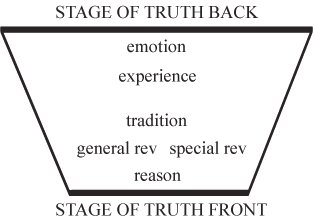(continued from
The Nature of Scripture 3)
In terms of the historical view of scripture, the world-view and story will always be the same despite the details. So story and world-view would fall closest to the idea of “inerrancy” since they must transcend culture and details and be true in their own right. The details would then serve to inform us that it is so (or not). And it would be completely possible for details to come along and replace, nullify, fulfill, subvert, or otherwise reorganize that story and world-view in the world in ways that conflict, contradict, or become errors when set into the linear reliance of the traditional model.
According to the historical model, the vice of the other is that in its insistence on preserving truth and keeping relativism at bay, it actually requires scripture to lose the truth of the string which formed it and then relies on individuals to relativistically reconstruct that missing string—to pick and chose how the details fit together to make sense as decided by their own biases, culture, viewpoints, and perspectives (which, undoubtedly, will be nothing like the string they were meant to have when they first read it).
Since this model rests on a pre-existing string and that string stretches across the details and is available for all to examine on a more obvious base, it seems less likely that picking and choosing or losing truth will occur. Finding the over-arching story and world-view should theoretically be much easier and have less variants in interpretation than trying to make individual details fit together. Understand the string (world-view and story) and all the details will fall in place and begin to make sense in all their difference capacities and contexts. Understand all the details and there may be no hope of ever finding the string without creating one arbitrarily, most likely very different from the original, and running into constant conflict and problems no only with the details, but with the great variety of ways other people put them together—a major problem in much of Protestantism today.
This view of scripture would lower the activity of “doctrine forming” from its high pedestal and raise up story and world-view to define and determine, to understand and to act. Christianity would become less about facts you believe and more about a story you are living and enacting (not that the facts one believes should disappear—I am not saying that). Instead of falling into legalism or relativism, this model would embrace freedom and variety while moving forward in a specific direction that is vitally and definitively important to Christian faith and life. The Bible would become not some book with a bunch of rules and intellectual truths, but a way of understanding what it means to be Christian in former days and then what it means to carry on that Christianity today. Just as the scriptures, which contain the word of God, went out into the world, so our lives would become like the scriptures, a complete package showing a story and world-view based on the same which formed scripture, but ours would make better sense in our culture and time in the details of our lives. This wouldn't be “biblical Christianity” in the sense that is most often referred to (i.e., believing all these lists of correct beliefs about morals and doctrine and theology), this would be Christianity as a kind of bible itself, as a carrier of the word of God in its own being that is a force to be reckoned with in the lives of men.
(End of parts
1,
2, and
3)




